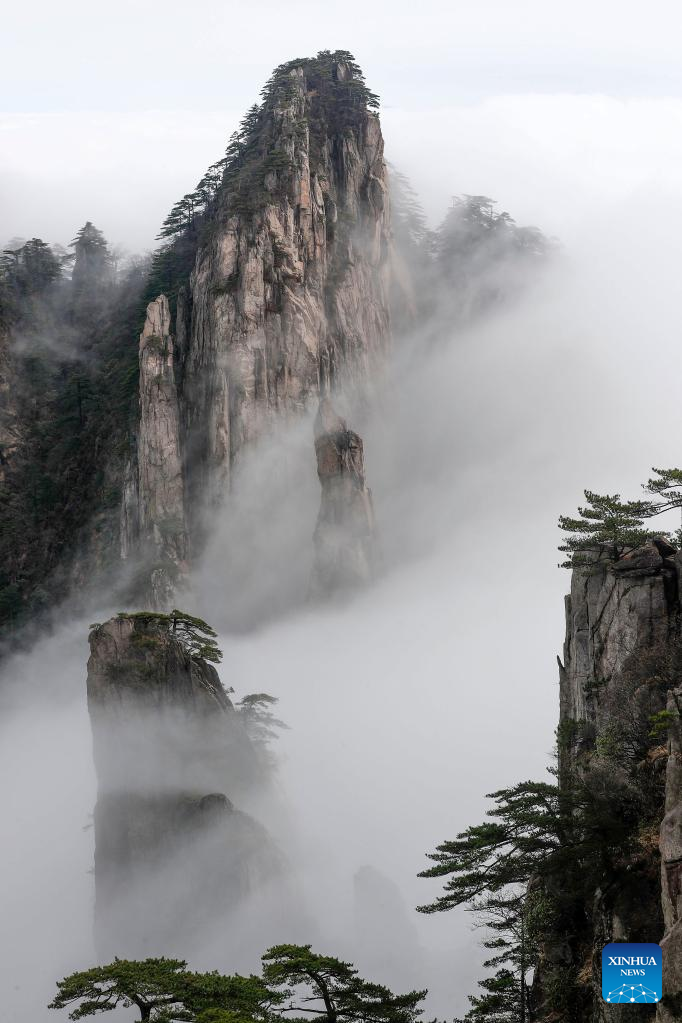
Photo taken on March 10, 2021 shows the scenery of Mount Huangshan.
Located in east China's Anhui Province, Mount Huangshan, also known as the Yellow Mountain, is renowned for its magnificent natural scenery including massive granitic boulders and ancient pine trees which are often further enhanced by cloud and mist effects. The property features numerous imposing peaks, many of which exceed an altitude of 1,000 meters, with the highest, the famous Lianhua Peak (Lotus Peak), reaching up to 1,864 meters.
Huangshan is also famous for its ancient paths, bridges and pavilions, as well as carvings and inscriptions on the mountain. It has inspired numerous pieces of literature, and originated the influential Shanshui ("Mountain and Water") school of landscape painting.
With its natural and cultural values well interconnected, Mount Huangshan was inscribed on the UNESCO World Cultural and Natural Heritage List in 1990.
A master plan for Mount Huangshan is currently under implementation, objectives of which are to balance conservation of the property with tourism promotion and to preserve effectively the artistic, cultural and environmental heritage value of the mountain. (Photo by Shi Yalei/Xinhua)
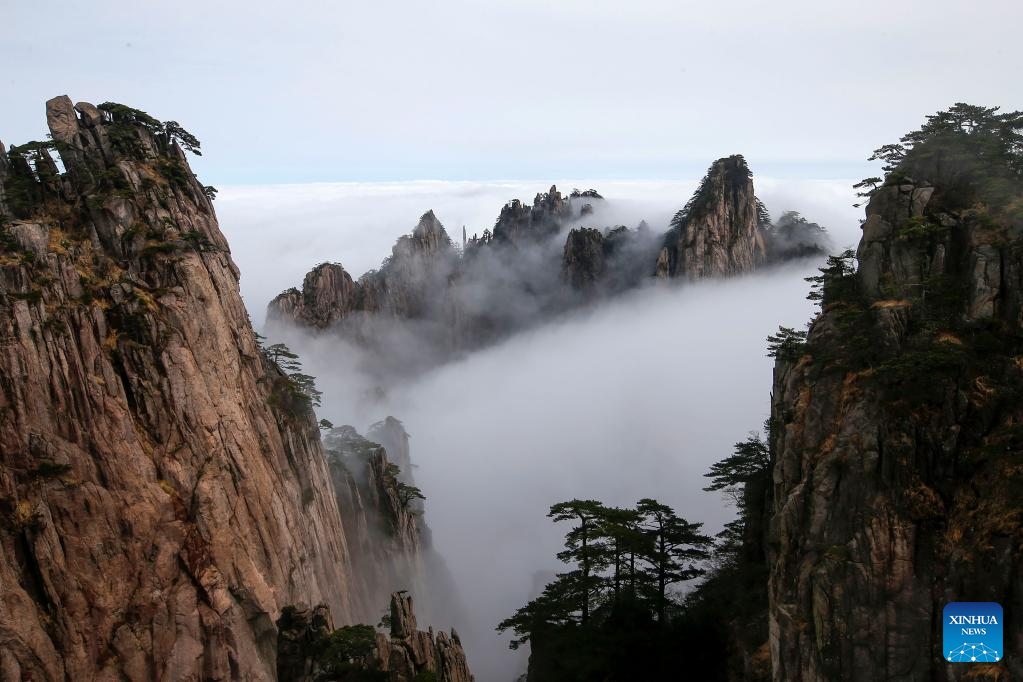
Photo taken on March 10, 2021 shows the scenery of Mount Huangshan.
Located in east China's Anhui Province, Mount Huangshan, also known as the Yellow Mountain, is renowned for its magnificent natural scenery including massive granitic boulders and ancient pine trees which are often further enhanced by cloud and mist effects. The property features numerous imposing peaks, many of which exceed an altitude of 1,000 meters, with the highest, the famous Lianhua Peak (Lotus Peak), reaching up to 1,864 meters.
Huangshan is also famous for its ancient paths, bridges and pavilions, as well as carvings and inscriptions on the mountain. It has inspired numerous pieces of literature, and originated the influential Shanshui ("Mountain and Water") school of landscape painting.
With its natural and cultural values well interconnected, Mount Huangshan was inscribed on the UNESCO World Cultural and Natural Heritage List in 1990.
A master plan for Mount Huangshan is currently under implementation, objectives of which are to balance conservation of the property with tourism promotion and to preserve effectively the artistic, cultural and environmental heritage value of the mountain. (Photo by Shi Yalei/Xinhua)

Tourists view the sunrise on Mount Huangshan, June 5, 2022.
Located in east China's Anhui Province, Mount Huangshan, also known as the Yellow Mountain, is renowned for its magnificent natural scenery including massive granitic boulders and ancient pine trees which are often further enhanced by cloud and mist effects. The property features numerous imposing peaks, many of which exceed an altitude of 1,000 meters, with the highest, the famous Lianhua Peak (Lotus Peak), reaching up to 1,864 meters.
Huangshan is also famous for its ancient paths, bridges and pavilions, as well as carvings and inscriptions on the mountain. It has inspired numerous pieces of literature, and originated the influential Shanshui ("Mountain and Water") school of landscape painting.
With its natural and cultural values well interconnected, Mount Huangshan was inscribed on the UNESCO World Cultural and Natural Heritage List in 1990.
A master plan for Mount Huangshan is currently under implementation, objectives of which are to balance conservation of the property with tourism promotion and to preserve effectively the artistic, cultural and environmental heritage value of the mountain. (Photo by Wang Xinping/Xinhua)
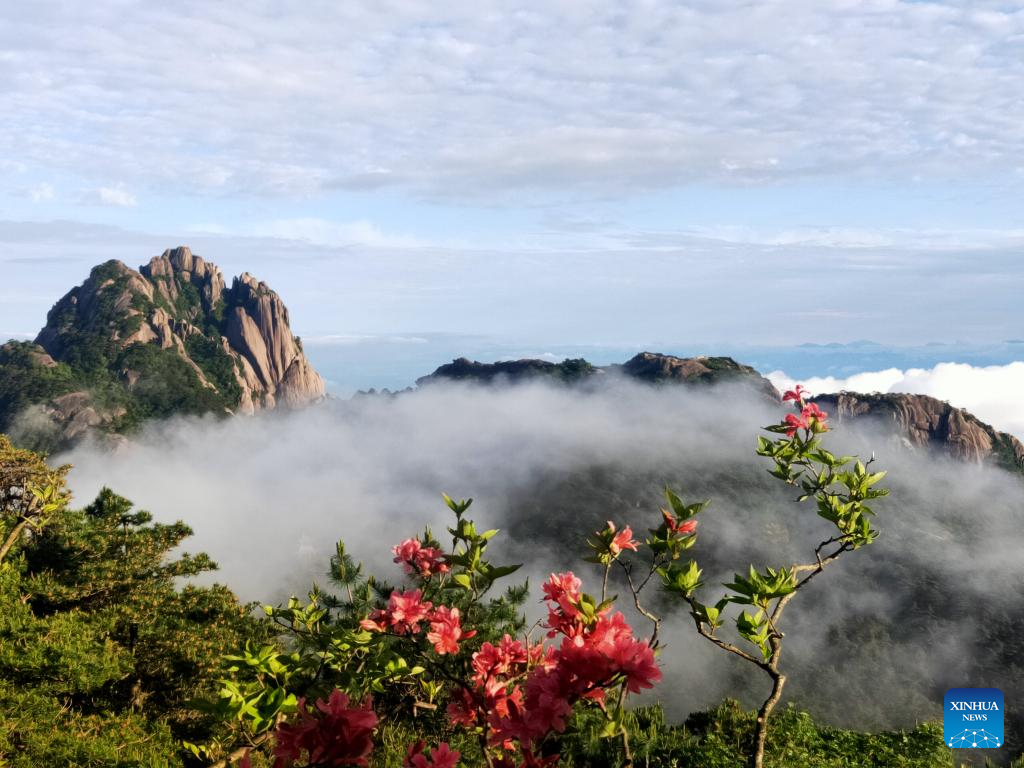
Photo taken on June 2, 2022 shows the scenery of Mount Huangshan.
Located in east China's Anhui Province, Mount Huangshan, also known as the Yellow Mountain, is renowned for its magnificent natural scenery including massive granitic boulders and ancient pine trees which are often further enhanced by cloud and mist effects. The property features numerous imposing peaks, many of which exceed an altitude of 1,000 meters, with the highest, the famous Lianhua Peak (Lotus Peak), reaching up to 1,864 meters.
Huangshan is also famous for its ancient paths, bridges and pavilions, as well as carvings and inscriptions on the mountain. It has inspired numerous pieces of literature, and originated the influential Shanshui ("Mountain and Water") school of landscape painting.
With its natural and cultural values well interconnected, Mount Huangshan was inscribed on the UNESCO World Cultural and Natural Heritage List in 1990.
A master plan for Mount Huangshan is currently under implementation, objectives of which are to balance conservation of the property with tourism promotion and to preserve effectively the artistic, cultural and environmental heritage value of the mountain. (Photo by Xu Gaoyun/Xinhua)
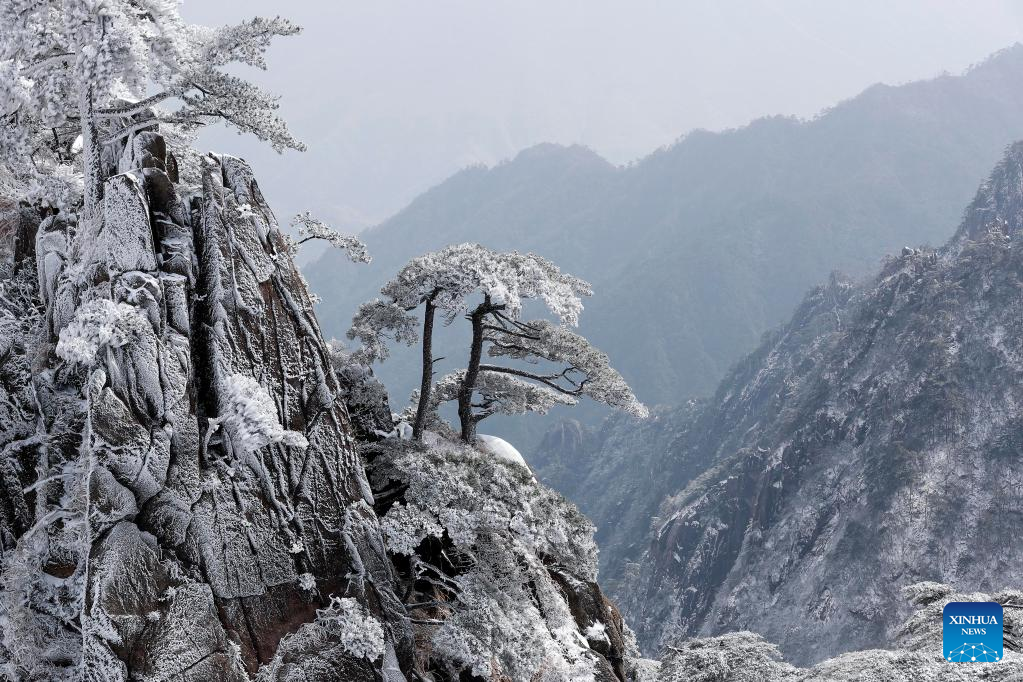
Photo taken on Nov. 22, 2021 shows the snowy scenery of Mount Huangshan.
Located in east China's Anhui Province, Mount Huangshan, also known as the Yellow Mountain, is renowned for its magnificent natural scenery including massive granitic boulders and ancient pine trees which are often further enhanced by cloud and mist effects. The property features numerous imposing peaks, many of which exceed an altitude of 1,000 meters, with the highest, the famous Lianhua Peak (Lotus Peak), reaching up to 1,864 meters.
Huangshan is also famous for its ancient paths, bridges and pavilions, as well as carvings and inscriptions on the mountain. It has inspired numerous pieces of literature, and originated the influential Shanshui ("Mountain and Water") school of landscape painting.
With its natural and cultural values well interconnected, Mount Huangshan was inscribed on the UNESCO World Cultural and Natural Heritage List in 1990.
A master plan for Mount Huangshan is currently under implementation, objectives of which are to balance conservation of the property with tourism promotion and to preserve effectively the artistic, cultural and environmental heritage value of the mountain. (Photo by Shi Yalei/Xinhua)

Tourists view the sunrise on Mount Huangshan, June 5, 2022.
Located in east China's Anhui Province, Mount Huangshan, also known as the Yellow Mountain, is renowned for its magnificent natural scenery including massive granitic boulders and ancient pine trees which are often further enhanced by cloud and mist effects. The property features numerous imposing peaks, many of which exceed an altitude of 1,000 meters, with the highest, the famous Lianhua Peak (Lotus Peak), reaching up to 1,864 meters.
Huangshan is also famous for its ancient paths, bridges and pavilions, as well as carvings and inscriptions on the mountain. It has inspired numerous pieces of literature, and originated the influential Shanshui ("Mountain and Water") school of landscape painting.
With its natural and cultural values well interconnected, Mount Huangshan was inscribed on the UNESCO World Cultural and Natural Heritage List in 1990.
A master plan for Mount Huangshan is currently under implementation, objectives of which are to balance conservation of the property with tourism promotion and to preserve effectively the artistic, cultural and environmental heritage value of the mountain. (Photo by Wang Xinping/Xinhua)
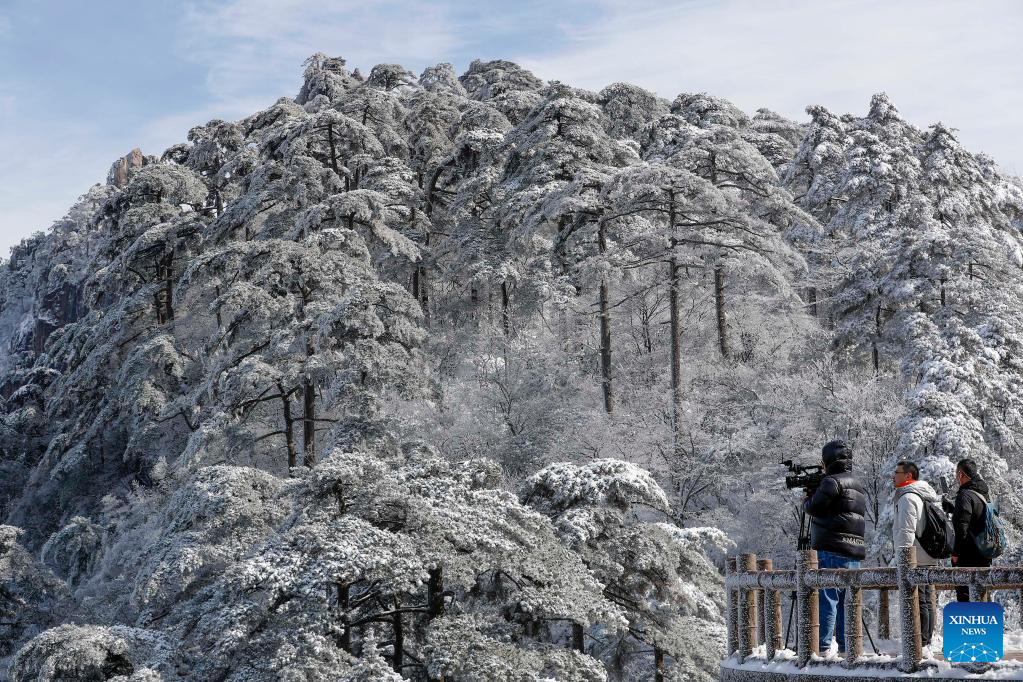
Photo taken on Nov. 22, 2021 shows the snowy scenery of Mount Huangshan.
Located in east China's Anhui Province, Mount Huangshan, also known as the Yellow Mountain, is renowned for its magnificent natural scenery including massive granitic boulders and ancient pine trees which are often further enhanced by cloud and mist effects. The property features numerous imposing peaks, many of which exceed an altitude of 1,000 meters, with the highest, the famous Lianhua Peak (Lotus Peak), reaching up to 1,864 meters.
Huangshan is also famous for its ancient paths, bridges and pavilions, as well as carvings and inscriptions on the mountain. It has inspired numerous pieces of literature, and originated the influential Shanshui ("Mountain and Water") school of landscape painting.
With its natural and cultural values well interconnected, Mount Huangshan was inscribed on the UNESCO World Cultural and Natural Heritage List in 1990.
A master plan for Mount Huangshan is currently under implementation, objectives of which are to balance conservation of the property with tourism promotion and to preserve effectively the artistic, cultural and environmental heritage value of the mountain. (Photo by Shi Yalei/Xinhua)
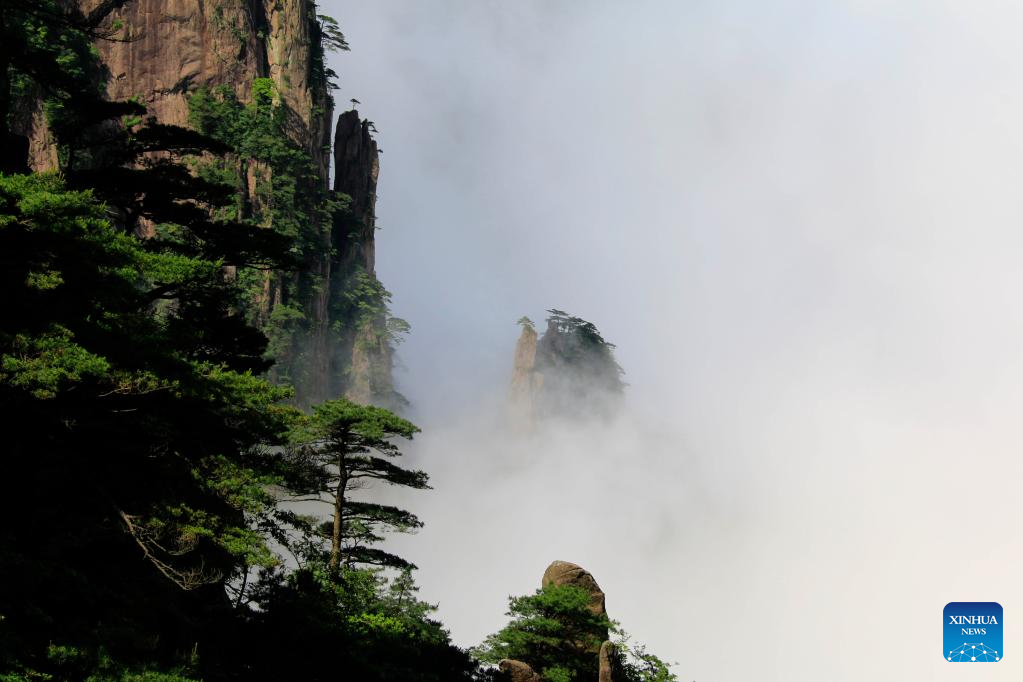
Photo taken on June 14, 2019 shows the scenery of Mount Huangshan.
Located in east China's Anhui Province, Mount Huangshan, also known as the Yellow Mountain, is renowned for its magnificent natural scenery including massive granitic boulders and ancient pine trees which are often further enhanced by cloud and mist effects. The property features numerous imposing peaks, many of which exceed an altitude of 1,000 meters, with the highest, the famous Lianhua Peak (Lotus Peak), reaching up to 1,864 meters.
Huangshan is also famous for its ancient paths, bridges and pavilions, as well as carvings and inscriptions on the mountain. It has inspired numerous pieces of literature, and originated the influential Shanshui ("Mountain and Water") school of landscape painting.
With its natural and cultural values well interconnected, Mount Huangshan was inscribed on the UNESCO World Cultural and Natural Heritage List in 1990.
A master plan for Mount Huangshan is currently under implementation, objectives of which are to balance conservation of the property with tourism promotion and to preserve effectively the artistic, cultural and environmental heritage value of the mountain. (Photo by Shi Guangde/Xinhua)
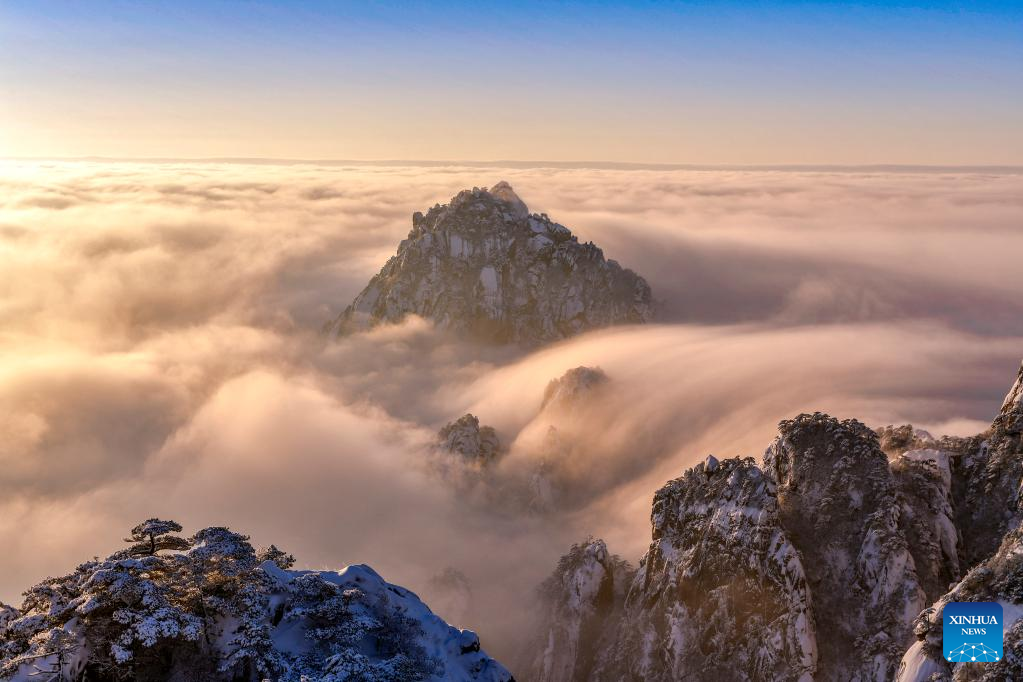
Photo taken on Dec. 31, 2018 shows the scenery of Mount Huangshan.
Located in east China's Anhui Province, Mount Huangshan, also known as the Yellow Mountain, is renowned for its magnificent natural scenery including massive granitic boulders and ancient pine trees which are often further enhanced by cloud and mist effects. The property features numerous imposing peaks, many of which exceed an altitude of 1,000 meters, with the highest, the famous Lianhua Peak (Lotus Peak), reaching up to 1,864 meters.
Huangshan is also famous for its ancient paths, bridges and pavilions, as well as carvings and inscriptions on the mountain. It has inspired numerous pieces of literature, and originated the influential Shanshui ("Mountain and Water") school of landscape painting.
With its natural and cultural values well interconnected, Mount Huangshan was inscribed on the UNESCO World Cultural and Natural Heritage List in 1990.
A master plan for Mount Huangshan is currently under implementation, objectives of which are to balance conservation of the property with tourism promotion and to preserve effectively the artistic, cultural and environmental heritage value of the mountain. (Photo by Shui Congze/Xinhua)
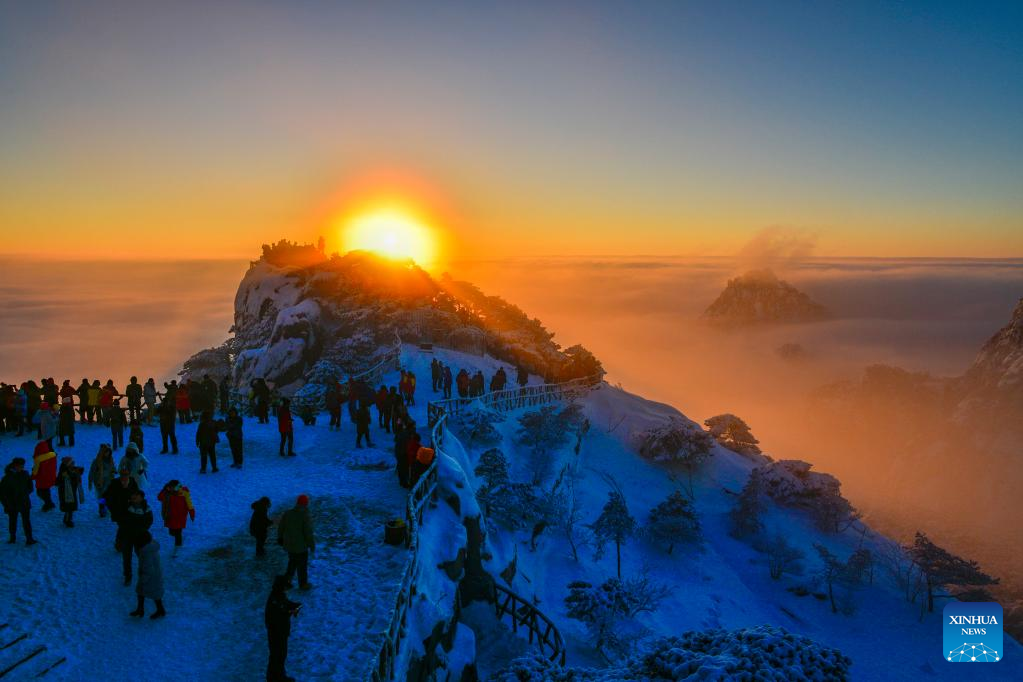
Tourists view the sunrise on Mount Huangshan, Dec. 31, 2018.
Located in east China's Anhui Province, Mount Huangshan, also known as the Yellow Mountain, is renowned for its magnificent natural scenery including massive granitic boulders and ancient pine trees which are often further enhanced by cloud and mist effects. The property features numerous imposing peaks, many of which exceed an altitude of 1,000 meters, with the highest, the famous Lianhua Peak (Lotus Peak), reaching up to 1,864 meters.
Huangshan is also famous for its ancient paths, bridges and pavilions, as well as carvings and inscriptions on the mountain. It has inspired numerous pieces of literature, and originated the influential Shanshui ("Mountain and Water") school of landscape painting.
With its natural and cultural values well interconnected, Mount Huangshan was inscribed on the UNESCO World Cultural and Natural Heritage List in 1990.
A master plan for Mount Huangshan is currently under implementation, objectives of which are to balance conservation of the property with tourism promotion and to preserve effectively the artistic, cultural and environmental heritage value of the mountain. (Photo by Shui Congze/Xinhua)
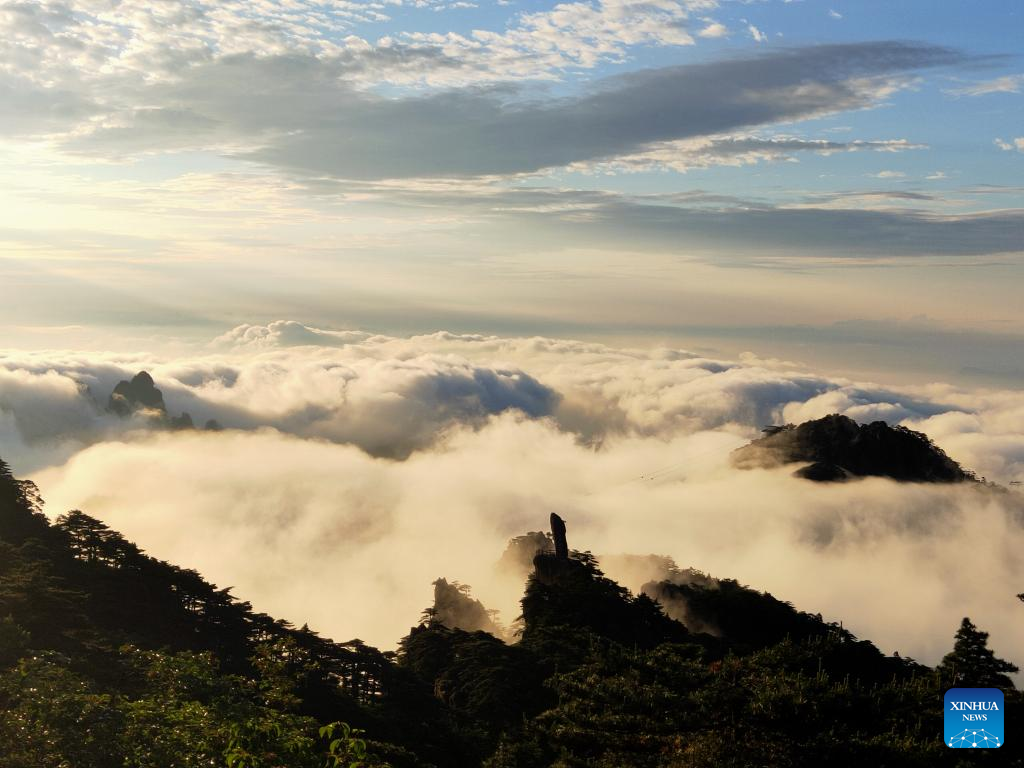
Photo taken on June 2, 2022 shows the scenery of Mount Huangshan.
Located in east China's Anhui Province, Mount Huangshan, also known as the Yellow Mountain, is renowned for its magnificent natural scenery including massive granitic boulders and ancient pine trees which are often further enhanced by cloud and mist effects. The property features numerous imposing peaks, many of which exceed an altitude of 1,000 meters, with the highest, the famous Lianhua Peak (Lotus Peak), reaching up to 1,864 meters.
Huangshan is also famous for its ancient paths, bridges and pavilions, as well as carvings and inscriptions on the mountain. It has inspired numerous pieces of literature, and originated the influential Shanshui ("Mountain and Water") school of landscape painting.
With its natural and cultural values well interconnected, Mount Huangshan was inscribed on the UNESCO World Cultural and Natural Heritage List in 1990.
A master plan for Mount Huangshan is currently under implementation, objectives of which are to balance conservation of the property with tourism promotion and to preserve effectively the artistic, cultural and environmental heritage value of the mountain. (Photo by Xu Gaoyun/Xinhua)
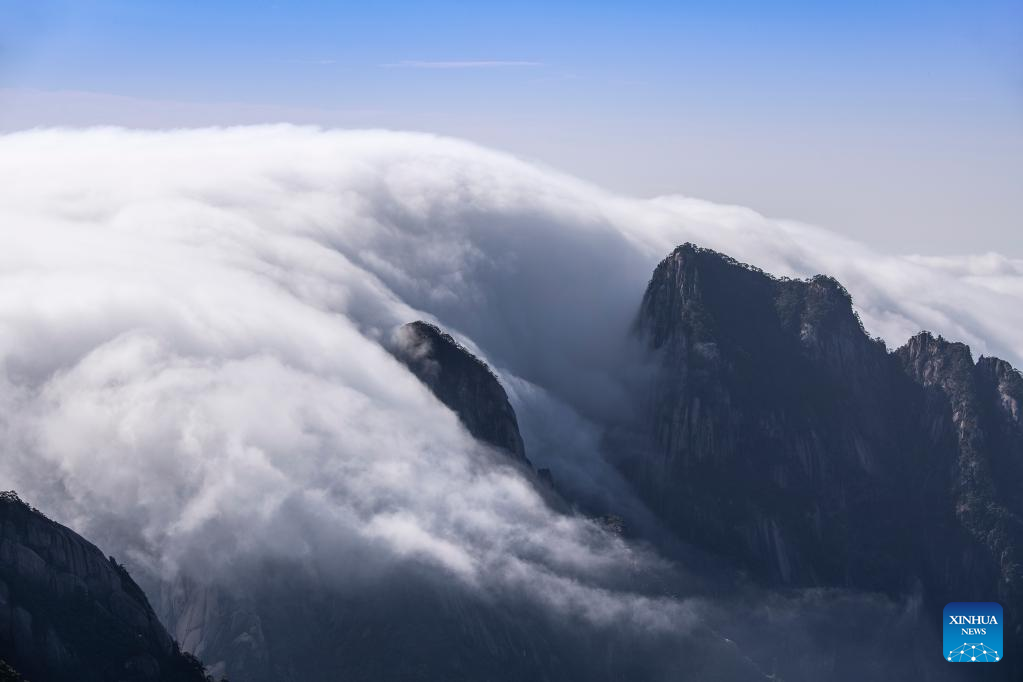
Photo taken on Nov. 20, 2018 shows the scenery of Mount Huangshan.
Located in east China's Anhui Province, Mount Huangshan, also known as the Yellow Mountain, is renowned for its magnificent natural scenery including massive granitic boulders and ancient pine trees which are often further enhanced by cloud and mist effects. The property features numerous imposing peaks, many of which exceed an altitude of 1,000 meters, with the highest, the famous Lianhua Peak (Lotus Peak), reaching up to 1,864 meters.
Huangshan is also famous for its ancient paths, bridges and pavilions, as well as carvings and inscriptions on the mountain. It has inspired numerous pieces of literature, and originated the influential Shanshui ("Mountain and Water") school of landscape painting.
With its natural and cultural values well interconnected, Mount Huangshan was inscribed on the UNESCO World Cultural and Natural Heritage List in 1990.
A master plan for Mount Huangshan is currently under implementation, objectives of which are to balance conservation of the property with tourism promotion and to preserve effectively the artistic, cultural and environmental heritage value of the mountain. (Photo by Shui Congze/Xinhua)
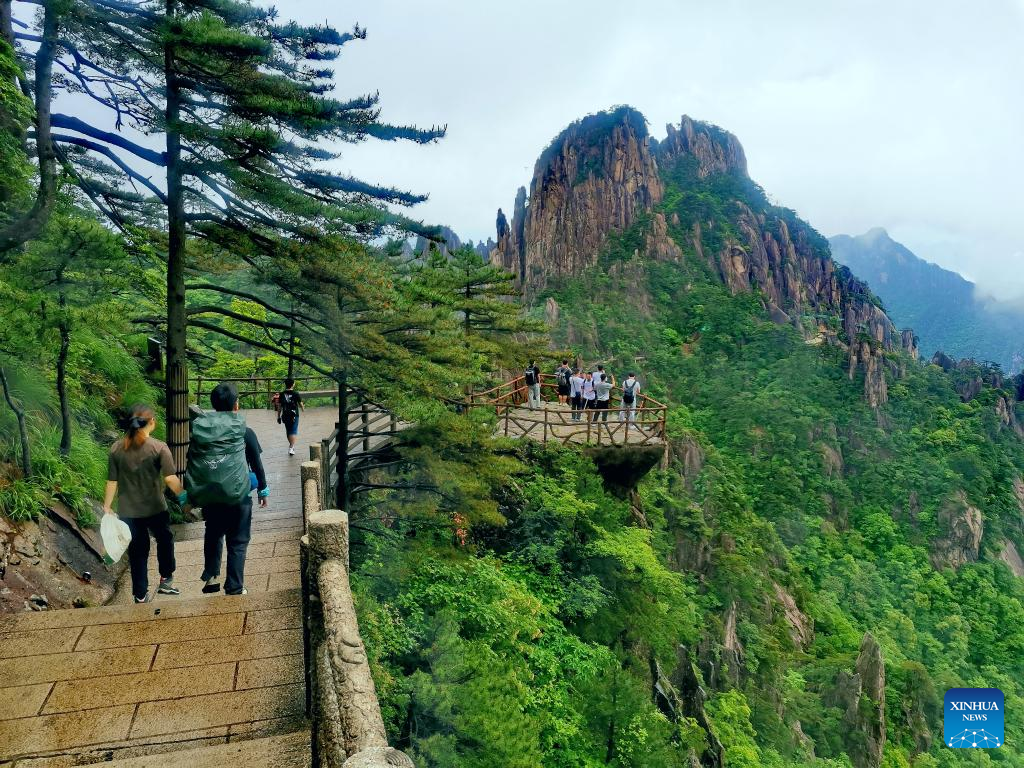
Photo taken on June 4, 2022 shows the scenery of Mount Huangshan.
Located in east China's Anhui Province, Mount Huangshan, also known as the Yellow Mountain, is renowned for its magnificent natural scenery including massive granitic boulders and ancient pine trees which are often further enhanced by cloud and mist effects. The property features numerous imposing peaks, many of which exceed an altitude of 1,000 meters, with the highest, the famous Lianhua Peak (Lotus Peak), reaching up to 1,864 meters.
Huangshan is also famous for its ancient paths, bridges and pavilions, as well as carvings and inscriptions on the mountain. It has inspired numerous pieces of literature, and originated the influential Shanshui ("Mountain and Water") school of landscape painting.
With its natural and cultural values well interconnected, Mount Huangshan was inscribed on the UNESCO World Cultural and Natural Heritage List in 1990.
A master plan for Mount Huangshan is currently under implementation, objectives of which are to balance conservation of the property with tourism promotion and to preserve effectively the artistic, cultural and environmental heritage value of the mountain. (Photo by Xie Chuanguang/Xinhua)
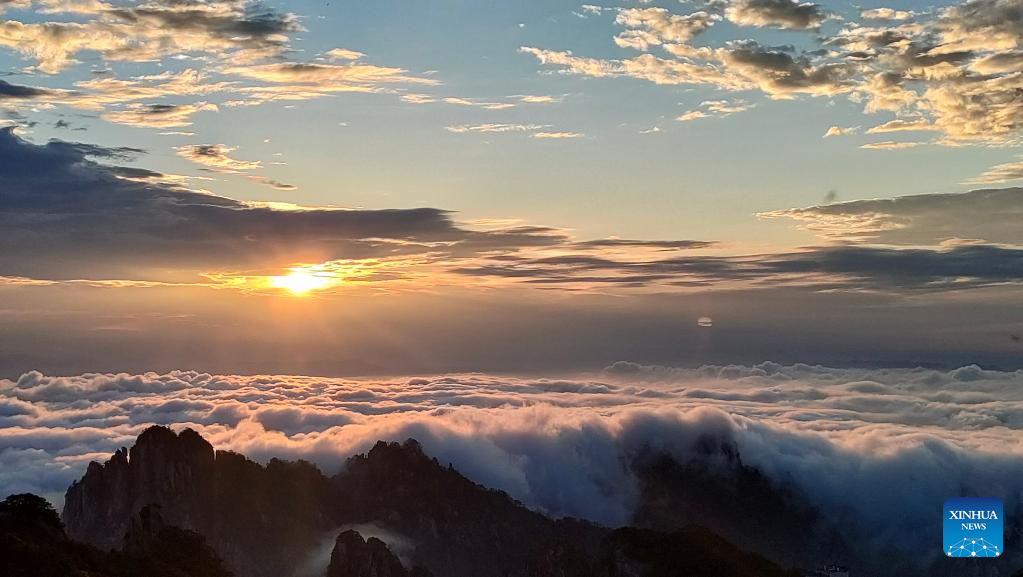
Photo taken on June 2, 2022 shows the scenery of Mount Huangshan.
Located in east China's Anhui Province, Mount Huangshan, also known as the Yellow Mountain, is renowned for its magnificent natural scenery including massive granitic boulders and ancient pine trees which are often further enhanced by cloud and mist effects. The property features numerous imposing peaks, many of which exceed an altitude of 1,000 meters, with the highest, the famous Lianhua Peak (Lotus Peak), reaching up to 1,864 meters.
Huangshan is also famous for its ancient paths, bridges and pavilions, as well as carvings and inscriptions on the mountain. It has inspired numerous pieces of literature, and originated the influential Shanshui ("Mountain and Water") school of landscape painting.
With its natural and cultural values well interconnected, Mount Huangshan was inscribed on the UNESCO World Cultural and Natural Heritage List in 1990.
A master plan for Mount Huangshan is currently under implementation, objectives of which are to balance conservation of the property with tourism promotion and to preserve effectively the artistic, cultural and environmental heritage value of the mountain. (Photo by Wang Xinping/Xinhua)
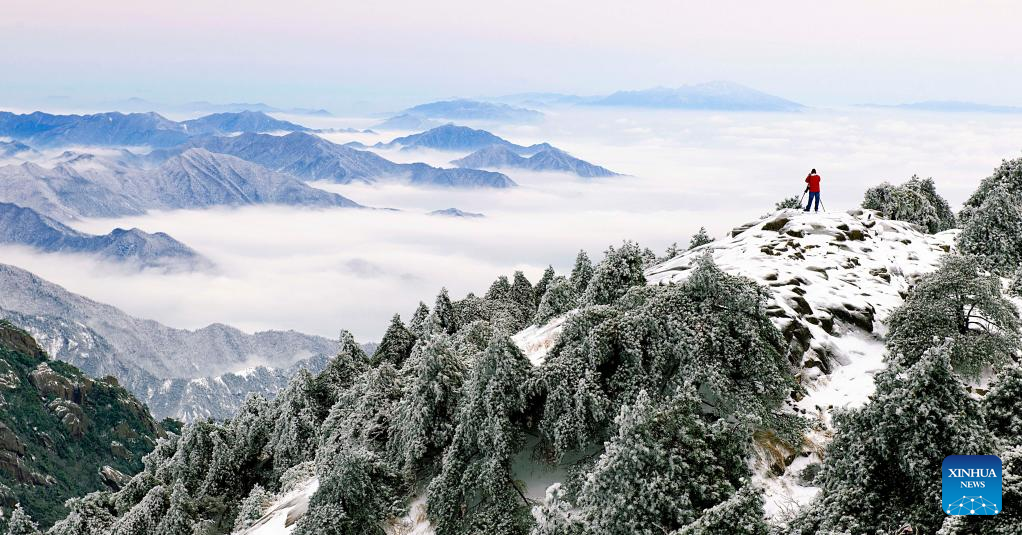
Photo taken on Dec. 12, 2018 shows the scenery of Mount Huangshan.
Located in east China's Anhui Province, Mount Huangshan, also known as the Yellow Mountain, is renowned for its magnificent natural scenery including massive granitic boulders and ancient pine trees which are often further enhanced by cloud and mist effects. The property features numerous imposing peaks, many of which exceed an altitude of 1,000 meters, with the highest, the famous Lianhua Peak (Lotus Peak), reaching up to 1,864 meters.
Huangshan is also famous for its ancient paths, bridges and pavilions, as well as carvings and inscriptions on the mountain. It has inspired numerous pieces of literature, and originated the influential Shanshui ("Mountain and Water") school of landscape painting.
With its natural and cultural values well interconnected, Mount Huangshan was inscribed on the UNESCO World Cultural and Natural Heritage List in 1990.
A master plan for Mount Huangshan is currently under implementation, objectives of which are to balance conservation of the property with tourism promotion and to preserve effectively the artistic, cultural and environmental heritage value of the mountain. (Photo by Pan Zhengguang/Xinhua)
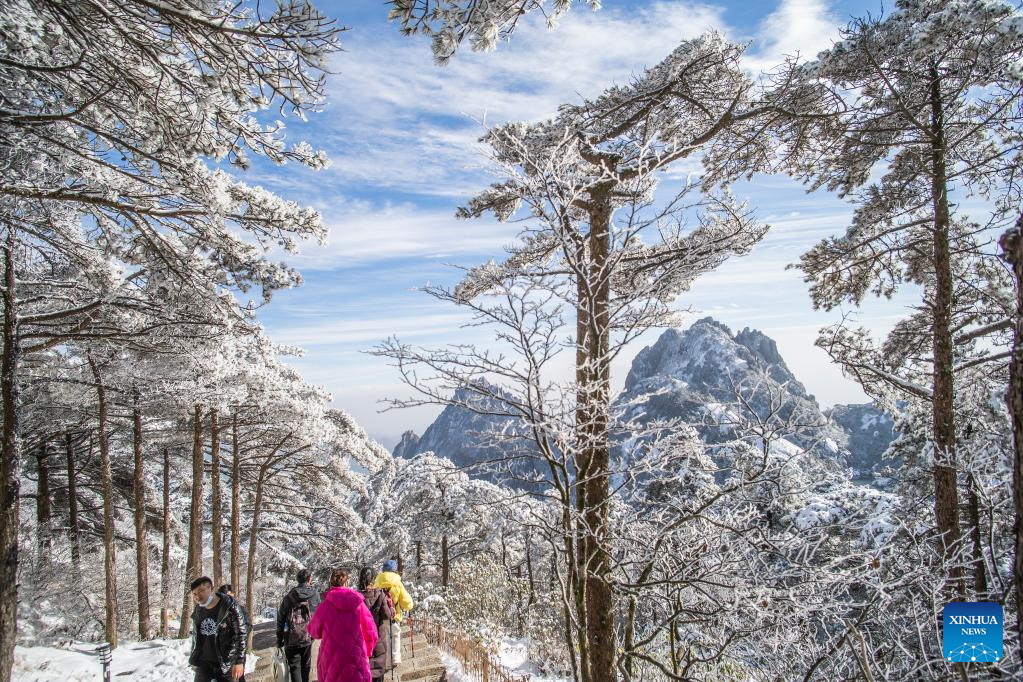
People view the snowy scenery of Mount Huangshan, Nov. 22, 2021.
Located in east China's Anhui Province, Mount Huangshan, also known as the Yellow Mountain, is renowned for its magnificent natural scenery including massive granitic boulders and ancient pine trees which are often further enhanced by cloud and mist effects. The property features numerous imposing peaks, many of which exceed an altitude of 1,000 meters, with the highest, the famous Lianhua Peak (Lotus Peak), reaching up to 1,864 meters.
Huangshan is also famous for its ancient paths, bridges and pavilions, as well as carvings and inscriptions on the mountain. It has inspired numerous pieces of literature, and originated the influential Shanshui ("Mountain and Water") school of landscape painting.
With its natural and cultural values well interconnected, Mount Huangshan was inscribed on the UNESCO World Cultural and Natural Heritage List in 1990.
A master plan for Mount Huangshan is currently under implementation, objectives of which are to balance conservation of the property with tourism promotion and to preserve effectively the artistic, cultural and environmental heritage value of the mountain. (Photo by Shui Congze/Xinhua)

A tourist takes photos of the scenery of Mount Huangshan, June 2, 2022.
Located in east China's Anhui Province, Mount Huangshan, also known as the Yellow Mountain, is renowned for its magnificent natural scenery including massive granitic boulders and ancient pine trees which are often further enhanced by cloud and mist effects. The property features numerous imposing peaks, many of which exceed an altitude of 1,000 meters, with the highest, the famous Lianhua Peak (Lotus Peak), reaching up to 1,864 meters.
Huangshan is also famous for its ancient paths, bridges and pavilions, as well as carvings and inscriptions on the mountain. It has inspired numerous pieces of literature, and originated the influential Shanshui ("Mountain and Water") school of landscape painting.
With its natural and cultural values well interconnected, Mount Huangshan was inscribed on the UNESCO World Cultural and Natural Heritage List in 1990.
A master plan for Mount Huangshan is currently under implementation, objectives of which are to balance conservation of the property with tourism promotion and to preserve effectively the artistic, cultural and environmental heritage value of the mountain. (Photo by Mei Jian/Xinhua)
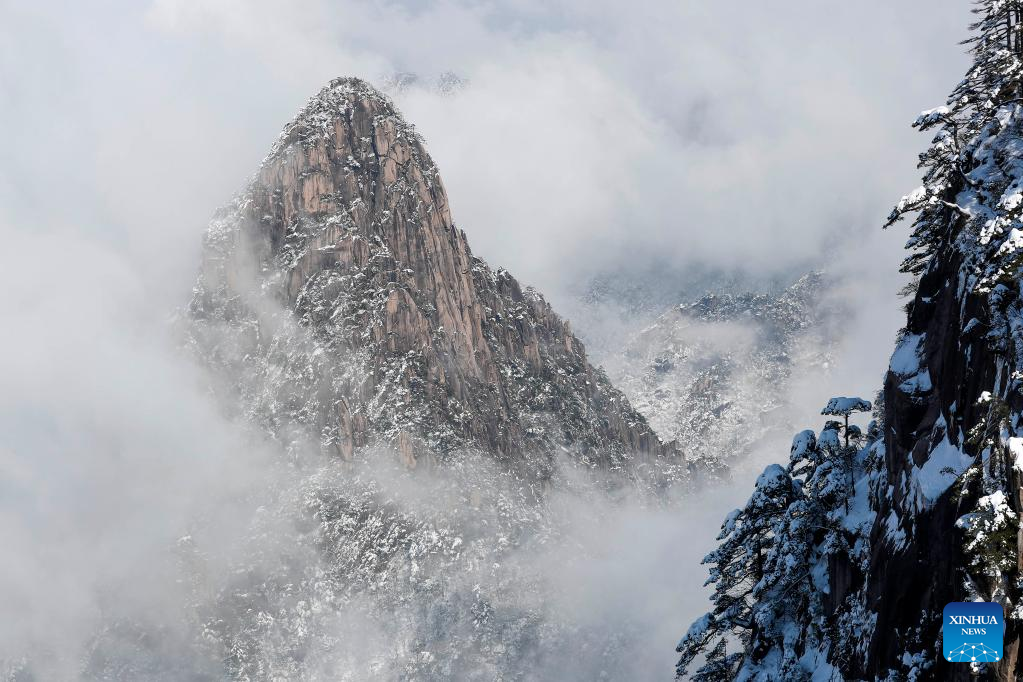
Photo taken on Feb. 5, 2022 shows the snowy scenery of Mount Huangshan.
Located in east China's Anhui Province, Mount Huangshan, also known as the Yellow Mountain, is renowned for its magnificent natural scenery including massive granitic boulders and ancient pine trees which are often further enhanced by cloud and mist effects. The property features numerous imposing peaks, many of which exceed an altitude of 1,000 meters, with the highest, the famous Lianhua Peak (Lotus Peak), reaching up to 1,864 meters.
Huangshan is also famous for its ancient paths, bridges and pavilions, as well as carvings and inscriptions on the mountain. It has inspired numerous pieces of literature, and originated the influential Shanshui ("Mountain and Water") school of landscape painting.
With its natural and cultural values well interconnected, Mount Huangshan was inscribed on the UNESCO World Cultural and Natural Heritage List in 1990.
A master plan for Mount Huangshan is currently under implementation, objectives of which are to balance conservation of the property with tourism promotion and to preserve effectively the artistic, cultural and environmental heritage value of the mountain. (Photo by Shi Yalei/Xinhua)

Photo taken on Dec. 12, 2018 shows the scenery of Mount Huangshan.
Located in east China's Anhui Province, Mount Huangshan, also known as the Yellow Mountain, is renowned for its magnificent natural scenery including massive granitic boulders and ancient pine trees which are often further enhanced by cloud and mist effects. The property features numerous imposing peaks, many of which exceed an altitude of 1,000 meters, with the highest, the famous Lianhua Peak (Lotus Peak), reaching up to 1,864 meters.
Huangshan is also famous for its ancient paths, bridges and pavilions, as well as carvings and inscriptions on the mountain. It has inspired numerous pieces of literature, and originated the influential Shanshui ("Mountain and Water") school of landscape painting.
With its natural and cultural values well interconnected, Mount Huangshan was inscribed on the UNESCO World Cultural and Natural Heritage List in 1990.
A master plan for Mount Huangshan is currently under implementation, objectives of which are to balance conservation of the property with tourism promotion and to preserve effectively the artistic, cultural and environmental heritage value of the mountain. (Photo by Pan Zhengguang/Xinhua)
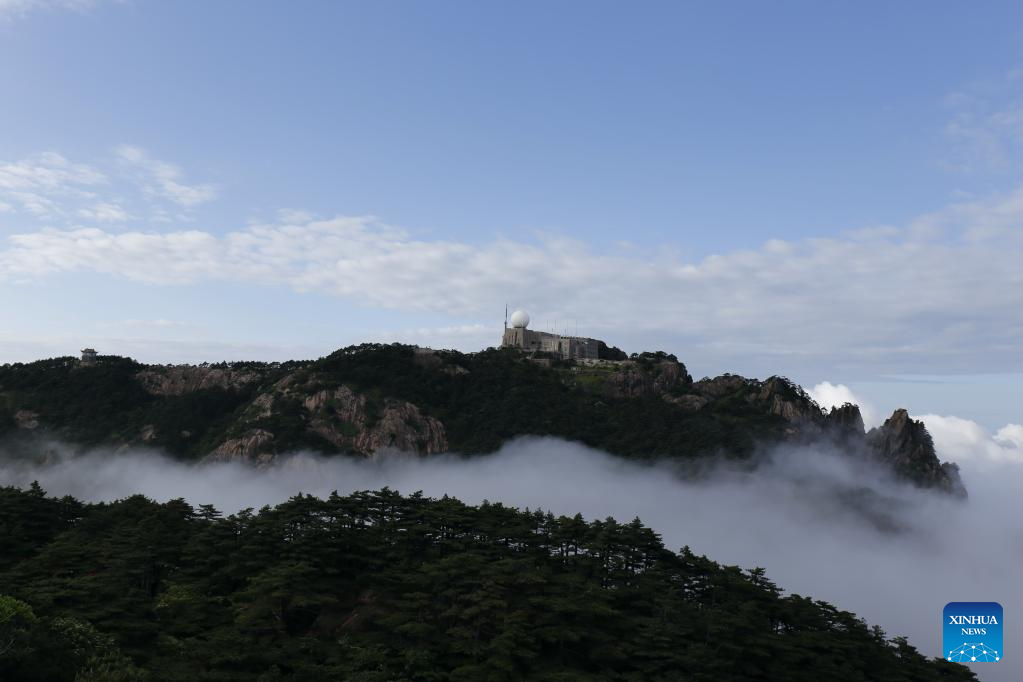
Photo taken on June 2, 2022 shows the scenery of Mount Huangshan.
Located in east China's Anhui Province, Mount Huangshan, also known as the Yellow Mountain, is renowned for its magnificent natural scenery including massive granitic boulders and ancient pine trees which are often further enhanced by cloud and mist effects. The property features numerous imposing peaks, many of which exceed an altitude of 1,000 meters, with the highest, the famous Lianhua Peak (Lotus Peak), reaching up to 1,864 meters.
Huangshan is also famous for its ancient paths, bridges and pavilions, as well as carvings and inscriptions on the mountain. It has inspired numerous pieces of literature, and originated the influential Shanshui ("Mountain and Water") school of landscape painting.
With its natural and cultural values well interconnected, Mount Huangshan was inscribed on the UNESCO World Cultural and Natural Heritage List in 1990.
A master plan for Mount Huangshan is currently under implementation, objectives of which are to balance conservation of the property with tourism promotion and to preserve effectively the artistic, cultural and environmental heritage value of the mountain. (Photo by Mei Jian/Xinhua)



